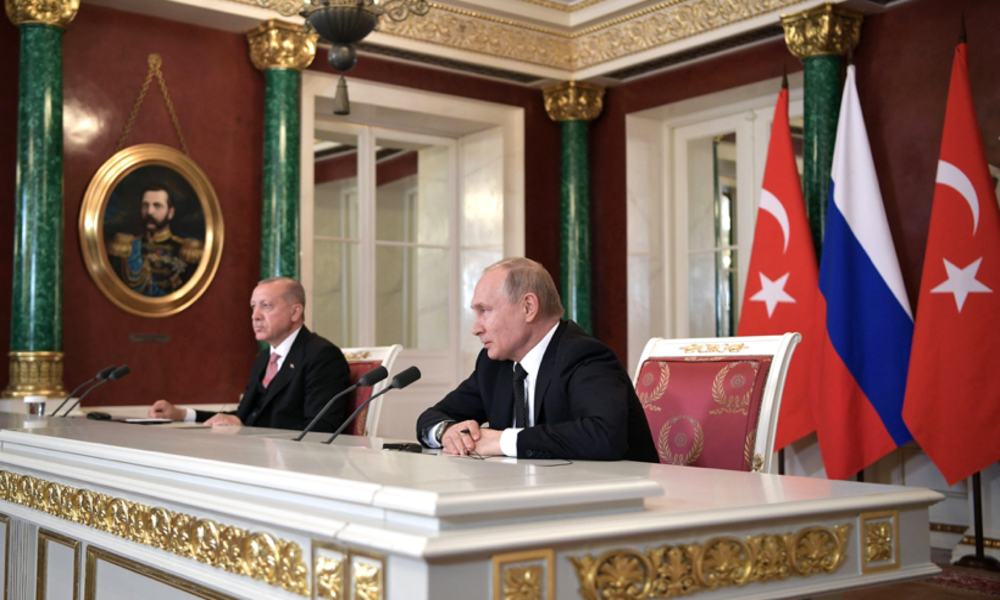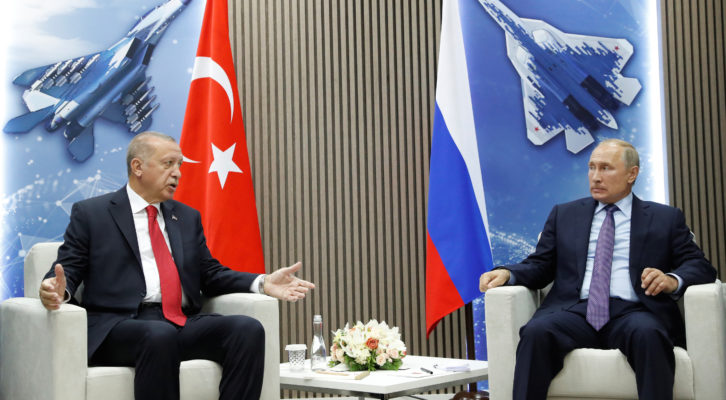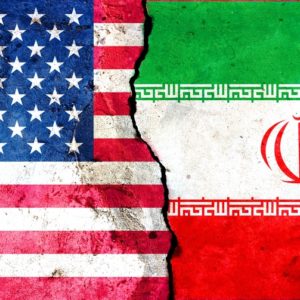Since the summer 2016 Turkish foreign policy has been facing a tough challenge – how to balance its growing partnership with Russia with its relations with the US. The rising tensions between the US and Russia, as well as the widening gap between the US and Turkish interests in Syria, the refusal by Washington to extradite cleric Fetullah Gulen, and simmering doubts among the Turkish leadership regarding the possible involvement of the US in the 2016 July military coup attempt, make this task even more daunting.
The construction of “Turkish stream” gas pipeline and Akkuyu nuclear power plant has created additional economic bonds with Russia while the delivery of S-400 air and missile defense systems, and as a result the expulsion of Turkey from F-35 advanced military jet program, has brought the Turkey – US relations to a new level of crisis. Meanwhile, the renewed hostilities in Idlib region and Syrian government forces attacks on some Turkish targets have created tensions in Ankara’s relations with Moscow. Amid this growing uncertainty some experts started to argue that Turkey failed in its efforts to simultaneously foster relations with both Russia and the US.
However, at the beginning of August Turkey has managed to agree on terms with the US regarding the establishment of a security zone in the Northeastern part of Syria, and the launch of a joint Turkey-US operation center. This was a key success for both Turkey and the US. If fully implemented, the deal will prevent the return of these territories to Syrian government control.

Russia, on its part, was urging Syrian Kurds to come to terms with President Assad and simultaneously offering Turkey guarantees that after the restoration of government control those territories will not be used as a launch pad for attacks against Turkey. Thus, the US – Turkey deal should raise concerns in Russia. The visit of Erdogan to Russia and meeting with President Putin, on 27 August, did not solve all bilateral problems regarding Syria, but was a proof that Turkish high-level channels of communication with Russia remain open.
To assess Turkey’s success or failure in its relations with Moscow and Washington we need to better understand Turkey’s vital national interests. Number one foreign policy priority for Turkey is Syria. Here Turkey has two strategic goals; prevention of the establishment of de facto independent Kurdish entity in the Northeastern part, and the preservation of its influence and military presence in Northwestern Syria which will allow Ankara to influence post-war Syrian geopolitics. To solve these two issues Turkey needs assistance from both Russia and the US. The Americans are key supporters of the Kurds and the two thousand US troops deployed there are a hard security guarantee for them. Meanwhile, Russia exerts influence both on the Syrian government and on the military developments in the Northwest. Thus, Turkey needs at least working relations with both Moscow and Washington to pursue its strategic interests in Syria. US and Russian interests are not fully compatible in Syria. They are both interested in defeating radical terrorist movements, but have different views on the future of the Northeastern parts of Syria. Russia argues for the full restoration of Syrian government control there, but for the Americans this scenario means further growth of Iranian influence, and is unacceptable.
In this complicated nexus of interests Turkey has quite successfully managed to pursue a pragmatic policy. Effectively using the leverage of military incursion into the Kurdish controlled Northeastern Syria, Turkey reached an agreement with the US to create a security zone there. Despite the lack of significant details on how this will work out, even striking a preliminary agreement is a success for Turkey, especially given the tensions with the US on F-35/S-400 issue. Meanwhile, Turkey effectively uses its relations with Russia to thwart further encroachment of Syrian government forces deeper into Idlib.
Turkey seeks to develop mutually beneficial relations also in the military-technical cooperation field. According to publicly available data, Turkey will receive not only S-400 systems but also some key Russian technologies. The technology transfer is of key importance for Turkey since it has ambitious plans to develop its own military industrial complex. Though Turkey has been expelled from the F-35 project, it is still considered a US and NATO strategic partner. Discussions on the possible purchase of advanced Russian military jets, such as SU 30, 35 or even fifth generation SU – 57, is a good leverage for Turkey to get concessions from the US for future military-technical cooperation projects.
Turkey’s successful strategic balancing act is not restricted to Syria. One of the key areas of US – Russia strategic competition is the Black Sea Basin, where Turkey plays a decisive role. Romania and Bulgaria lack the necessary military resources to be key NATO players here. Turkey, on its part, while developing partner relations with Russia, firmly supports the collective Western approach on Ukraine. During his meeting with Ukraine President Zelenski on August 7, Erdogan clearly stated that Turkey will not accept the illegal annexation of Crimea, and emphasized the importance of protection for the rights of Crimean Tatar.
Thus, at least for now, Turkey is successfully managing to implement a strategic balancing act in its relations with the US and Russia. Other regional actors may look at this policy and take good note.
The article was originally published at Commanspace.eu on 9/9/2019
Dr. Benyamin Poghosyan is Executive Director, Political Science Association of Armenia holding this position since February 2011. He was Vice President for Research – Head of the Institute for National Strategic Studies at the National Defense Research University in Armenia in August 2016 – February 2019. He joined Institute for National Strategic Studies (predecessor of NDRU) in March 2009 as a Research Fellow and was appointed as INSS Deputy Director for research in November 2010. Before this, he was Foreign Policy Adviser of the Speaker of the National Assembly of Armenia. Dr. Poghosyan has also served as a Senior Research Fellow at the Institute of History of the National Academy of Sciences and was an adjunct professor at Yerevan State University and in the European Regional Educational Academy.
His primary research areas are geopolitics of the South Caucasus and the Middle East, US – Russian relations and their implications for the region. He is the author of more than 70 Academic papers and OP-EDs in different leading Armenian and international journals. In 2013, Dr. Poghosyan was appointed as a Distinguished Research Fellow” at the US National Defense University – College of International Security Affairs and also, he is a graduate from the US State Department’s Study of the US Institutes for Scholars 2012 Program on US National Security Policy-Making. He holds a Ph.D. in History and is a graduate from the 2006 Tavitian Program on International Relations at Fletcher School of Law and Diplomacy.







